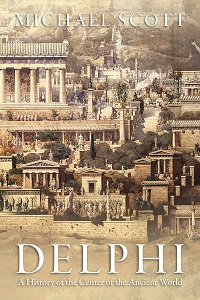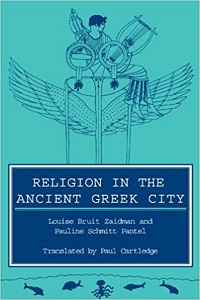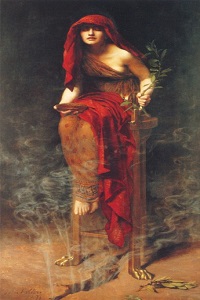How will these resources help you?
Much of the teaching about the ancient world is focused on men, especially military or political leaders. However, there is one place that was dominated by a woman for 1500 years: the Oracle of Delphi. Delphi was the most significant place in antiquity for consulting the divine, and the person who uttered the prophecies was a woman called the Pythia, the prophetess of Apollo. These resources give a detailed insight into the role that the Pythia played at the Oracle, as well as offering some teaching resources. They also help to explain why the Oracle was such a central part of ancient Greek life, as well as being influential over the Romans. By understanding the role of the Pythia at Delphi – the most powerful female voice in the ancient world – your students will be able to discuss the significance of women to decision-making in antiquity.
Understanding the importance of Delphi

Delphi: A History of the Center of the Ancient World
by Michael Scott, published by Princeton University Press, (2015), 9780691169842
Scott’s aim is to uncover the story of Delphi and its significance to the ancient world. In this accessible book, he looks to cover the entirety of Delphi’s history, and thus explains the role of the Pythia in multiple historical settings. This is the best place to find an authoritative account of the process by which the Pythia was chosen, and how she gave out oracles. There is actually no complete account of the Pythia’s activities, as ancient writers made the assumption that it was common knowledge.
Most interestingly, Scott explains what the oracular process meant. Each chapter traces the influence of the Pythia in different periods of history. Her significance is evident in the role she played in advising cities about colonies, war, alliances and ‘the extent to which Delphi was conceived of… as an enforcer of civic values.’ Scott suggests that the Pythia was less a fortune-telling service than a ‘sense-making mechanism’. As such, the Pythia operated as a form of ‘guidance rather than revelation’, and by giving ambiguous answers, she prompted consultants to discuss an issue further. You could use the existence of this mechanism as the focus of a discussion into the nature of the Pythia’s influence over the ancient world.
Most interestingly, Scott explains what the oracular process meant. Each chapter traces the influence of the Pythia in different periods of history. Her significance is evident in the role she played in advising cities about colonies, war, alliances and ‘the extent to which Delphi was conceived of… as an enforcer of civic values.’ Scott suggests that the Pythia was less a fortune-telling service than a ‘sense-making mechanism’. As such, the Pythia operated as a form of ‘guidance rather than revelation’, and by giving ambiguous answers, she prompted consultants to discuss an issue further. You could use the existence of this mechanism as the focus of a discussion into the nature of the Pythia’s influence over the ancient world.
The religious centre of Ancient Greece

Religion in the Ancient Greek City
by Louise Bruit Zaidman and Pauline Schmitt Pantel, published by Cambridge University Press, (1992), 9780521423571
This concise, readable book is a wider investigation into religion in ancient Greece, with a useful section on Delphi. As the authors explain, ‘Delphi, in religious terms, was the centre of the Greek world.’ This idea offers the chance to discuss with students why such an apparently isolated place was able to wield such power, as well as assess how it was that a woman was the central figure there.
Chapter 11 investigates several Panhellenic cults and outlines Delphi’s importance: ‘whereas Olympia mostly dozed between Olympics, Apollo’s sanctuary at Delphi was a constant hive of activity, thanks to its oracle.’ Investigating some very useful examples of the Pythia’s oracular sayings, the authors offer the helpful conclusion that: ‘the divine word… was not received as a prediction but as one of the parameters constraining human action.’
Chapter 11 investigates several Panhellenic cults and outlines Delphi’s importance: ‘whereas Olympia mostly dozed between Olympics, Apollo’s sanctuary at Delphi was a constant hive of activity, thanks to its oracle.’ Investigating some very useful examples of the Pythia’s oracular sayings, the authors offer the helpful conclusion that: ‘the divine word… was not received as a prediction but as one of the parameters constraining human action.’
The significance of the Pythia

Hidden women of history: the priestess Pythia at the Delphic Oracle, who spoke truth to power
by Julia Kindt, published by The Conversation, (29 January, 2019)
This scholarly article offers some crucial insights into the importance of the Pythia. Kindt argues that the lack of any overarching authorities in ancient Greece gave the Pythia extra significance: ‘The position of the Pythia seemed to have entailed the extraordinary opportunity to speak unwelcome truth to those in power.’ There is also a useful account of the day-to-day role of the Pythia.
Further materials
‘A day in the life of the Oracle of Delphi’ by Mark Robinson, published by TEDEd
Watch this video
Religion and the Greeks by Robert Garland, published by Bristol Classical Press, (1998), 9781853994098
Find this book
Mark Robinson is a history teacher who has many years’ experience of teaching both History and Classical Civilisation. He has also been an examiner. He has written on a wide range of topics for the educational website TEDEd.
Text © Mark Robinson, 2021-2023
Text © Mark Robinson, 2021-2023



